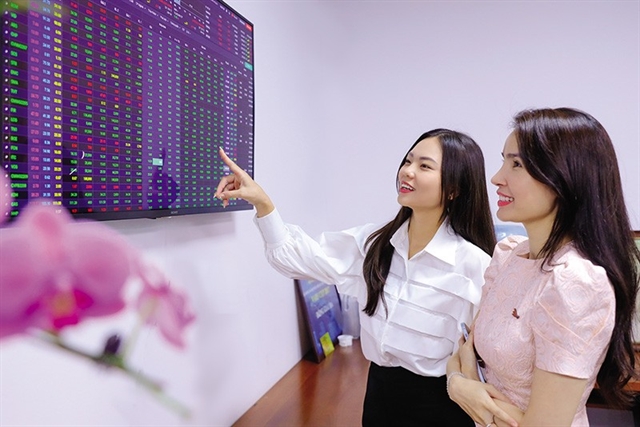 Economy
Economy

 |
| Two investors watch stock indices on an e-board at a securities company. Information transparency is an indispensable requirement for the market to be upgraded. The more transparent financial information is, the more a business attracts the attention of investors. — VNA/VNS Photo |
HÀ NỘI — The goal of upgrading the stock market by 2025 requires the concerted efforts of ministries and market members.
In the frontier market basket of FTSE Russell, Vietnamese stocks account for 34 per cent of market capitalisation, according to data updated on August 31, 2023. With the largest number of companies at 103 and 6 representatives in the top 10 by size in the FTSE index basket, the frontier market basket seems to become narrow for the 23-year-old stock market.
While many markets are still struggling to meet the criteria for scale and liquidity to upgrade to emerging market status, the Việt Nam stock market faces challenges related to foreign investor market access. In the September 2023 market rating assessment, FTSE Russell continued to keep Việt Nam on the waiting list for upgrading from a frontier market to an emerging market.
It has been almost was years since the country was included in the list. According to FTSE Russell, Việt Nam’s stock market reform progress remains slow, although there have been commitments from high-level leaders.
Information transparency is an indispensable requirement for the market to be upgraded. The more transparent financial information is, the more a business attracts the attention of investors, said economic expert Võ Trí Thành.
The biggest policy "bottleneck" for Vietnamese stocks to achieve FTSE Russell's upgrade criteria is the expansion of "room" for foreign investors. State management agencies are looking for feasible solutions, Thành said.
However, there are things that the policy allows, but listed businesses are not ready to receive capital. For example, Decree 60/2015/NĐ-CP stipulates a maximum foreign ownership limit of up to 100 per cent. But many businesses decided to limit their foreign "room" to 0 per cent, not welcoming foreign capital.
Upgrading the market requires the co-operation of many parties, not only from ministries and branches, but also from listed businesses themselves, according to Trần Việt Dũng, Director of the Institute of Banking Scientific Research under Banking Academy.
However, many businesses have not voluntarily provided information. For non-mandatory requirements, such as disclosing information in English or applying the IFRS accounting regime, only a few large enterprises comply.
Vũ Đức Tiến, General Director of SHS, said that awareness in information disclosure is a must. Businesses need to understand that transparent information disclosure is a right to attract capital. Tougher measures on information transparency are needed.
An estimated US$7.2 billion of indirect foreign capital is expected to flow into the Vietnamese market, according to a World Bank report. Moreover, a higher-rated stock market also increases confidence among domestic investors, large-scale institutional investors, and diversifies the investor base.
The market upgrade opens up opportunities to enhance the position and image of the Vietnamese capital market, improving the attractiveness and competitiveness of Việt Nam's economy in the regional and international arena, said Vũ Chí Dũng, Head of International Co-operation Department under State Securities Commission.
Dũng said that a larger flow of indirect foreign capital can have a stronger impact on market volatility, both in terms of buying and selling, and psychological influence as well. The rapid increase in trading puts pressure on the systems, requiring infrastructure stability. — VNS




